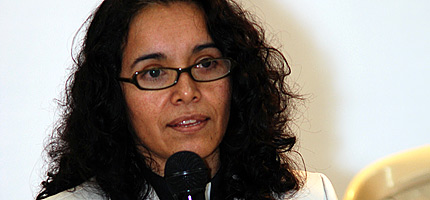© IELCO/Luis Eduardo Ramirez
14.04.2010
Emphasis on Communal Sharing of “Daily Bread” at Regional LWF Gathering
Churches Urged to Promote More Humane and Fair Economies
BOGOTÁ, Colombia/GENEVA, 14 April 2010 (LWI) - When Christians pray “give us this day our daily bread,” they are praying for bread to be shared with others, said Rev. Dr Patricia Cuyatti, former president of the Peruvian Lutheran Evangelical Church. She was addressing participants in The Lutheran World Federation (LWF) Pre-Assembly Consultation and Church Leadership Conference for Latin American and Caribbean churches taking place in Bogotá, Colombia, 12-16 April.
“Jesus teaches us to pray in plural: “our daily bread, give us today,” she said, because bread only makes sense if enjoyed in community. “Bread without community is tasteless bread,” stressed Cuyatti in her keynote address at the regional meeting to prepare for the LWF Eleventh Assembly, scheduled this July in Stuttgart, Germany, under the theme “Give Us Today Our Daily Bread.”
Citing Martin Luther’s teaching on the Lord’s Prayer, the Peruvian church leader said, “In Luther’s explanation about the request for daily bread, he details with simplicity that the bread refers to everything that is needed in order to have life. It is a focus on the communal that includes family, work and community life.”
Cuyatti explained the petition’s emphasis on collective community by evoking the biblical passage on Jesus’ temptation in the wilderness. “Jesus didn’t want to convert stones into bread: there was no community to share it, and therefore the bread did not have any meaning,” she said.
The prayer also calls for solidarity, she noted. “The symbol of bread is to be supportive, [as] shared bread has different flavors. … Our daily bread is a plea for justice. It is a pastoral attention to those who have nothing in a warm way of welcoming and sharing.” The failure to have bread distributed equally “in our context should never be a reason to give up in our stubborn hope that comes with the fourth petition,” she said.
“For us in Latin America, amid times of crisis, individualization and our history of colonization, the sharing of bread goes to promote and facilitate more humane and fair economies, knowing that exploitation is a sin,” she added.
Cuyatti’s presentation also cited the global ecological crisis and called upon churches to “urgently reconsider the way in which we relate to the Earth, which is being oppressed and suffers violence.”
A panel discussion at the pre-assembly focused on the social and economic conflicts across the region. Bishop Melvin Jiménez of the Lutheran Costa Rican Church said that when facing such conflicts, Christians “are left with only one option; make the church alive, embodied in and accompanying the struggle of the people.”
Bishop Medardo E. Gómez Soto of the Salvadoran Lutheran Church said of the region’s struggles, “The greater the pain of the people, the greater their hope.” Other panelists included Rev. Luis Cristóbal Alejo Fernández (Bolivia) who affirmed the church’s crucial response to issues such as human trafficking, drug trafficking and their related consequences on people’s lives in the region.
Ms Elisa Figueroa, from the city of Talcahuano, which was hard hit by the recent quake in Chile, stated, “This earthquake didn’t only [show] the cracks of buildings but also of our society and its values.” She was referring to the lack of solidarity among the local population after the disaster.
“The Caribbean region is amazingly rich, but the distribution of this wealth is unfair,” added Rev. Kenneth Kross from Suriname.
There are an estimated 50 participants in the pre-assembly, including 26 delegates from the 16 LWF member churches in the Latin America and Caribbean region. (604 words)
Journey | Latin America/Caribbean Pre-Assembly Consultation

